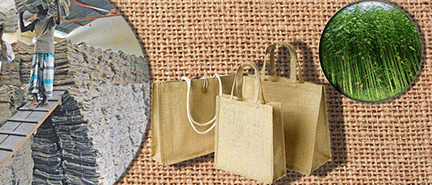Jute packaging mandatory for more products
The government of Bangladesh has made jute packaging mandatory for 11 more products to boost domestic use of the golden fibre following anti-dumping duty imposed by India on Bangladeshi jute and jute goods.
India on January 5 imposed, to the Bangladeshi exporters’ dismay, anti-dumping duty ranging from $19 to $352 a tonne on import of jute and jute goods from Bangladesh.
The textile and jute ministry on January 21 issued a gazette notification amending the Mandatory Jute Packaging Rule 2013 and making use of jute bags for the agricultural products mandatory.

According to the notification, growers and traders will have to compulsorily use jute bags for packaging of chilli, onion, garlic, turmeric, ginger, pulses, coriander, potato, flour (two types) and rice bran.
Paddy, rice, wheat, maize, fertiliser and sugar have been in the mandatory jute packaging list since late 2015 as the government wants to limit the use of polythene bags and encourage the use of jute goods.
Officials of the textile and jute ministry said that the latest decision would boost domestic use of jute and jute products and help the industry to recover from the blow it received due to the India’s anti-dumping duty.
The Department of Jute estimates that the decision may create an additional demand for 726,000 bales or 132,000 tonnes of jute a year.
Jute and jute goods manufacturers and exporters apprehend that the anti-dumping duty would hamper the export of the products to India, the largest market for Bangladeshi jute and jute goods.
They said that the government’s move would help them to offset losses in case of any fall in export to India.
The government has also decided to request India to withdraw the duty along with the Bangladeshi exporters’ move to file appeal with the Indian court against the duty.
According to the Export Promotion Bureau data, exports of jute and jute goods to India in last financial year 2015-16 grew by more than 150 per cent to $260.74 million from $104.51 million in the previous fiscal year.
The country’s export earnings from jute and jute goods stood at around $1 billion in FY16 and India accounted for 20 per cent of the total export earnings.
According to the DoJ, the total production of raw jute was 87.64 lakh bales while the production of jute goods was 9.63 lakh tonnes in the country in FY16.
In the same fiscal year, Bangladesh exported 13.07 lakh bales raw jute and 7.42 lakh tonnes of jute goods.
